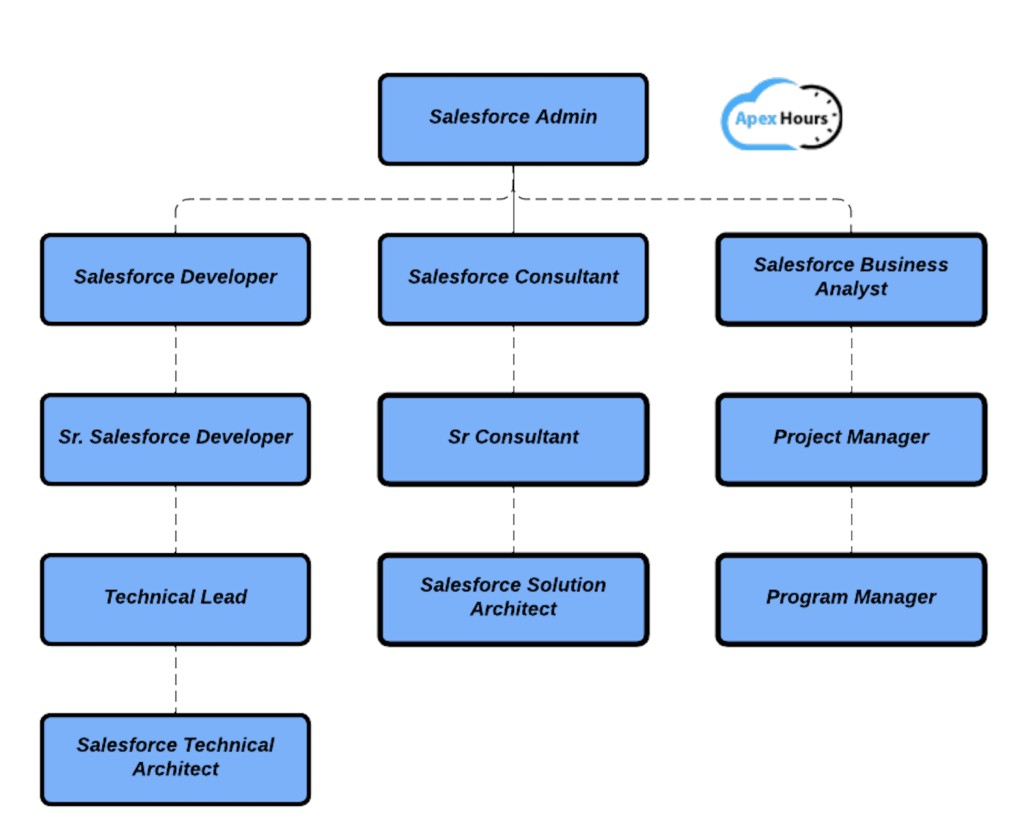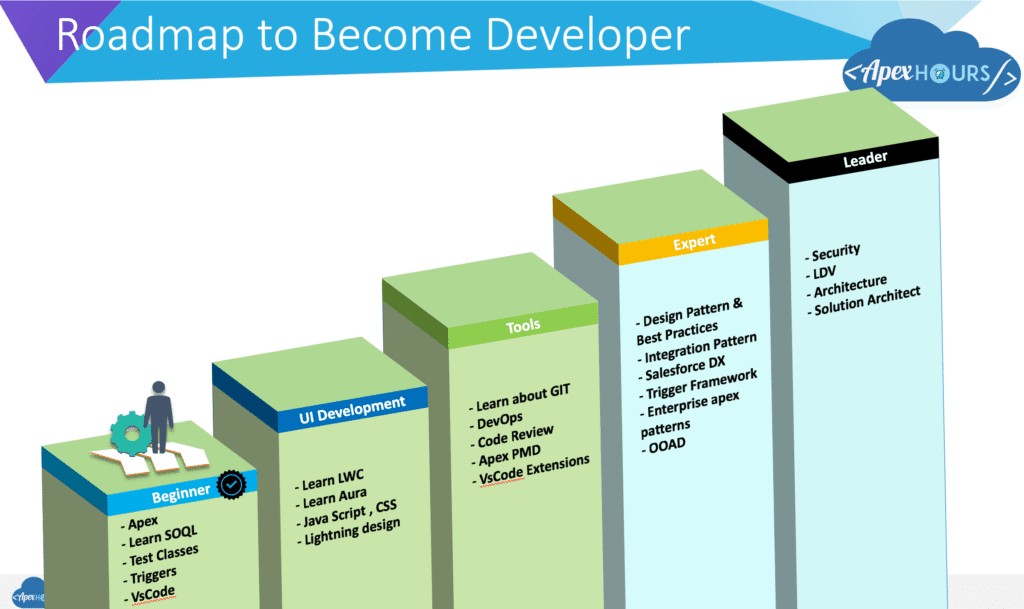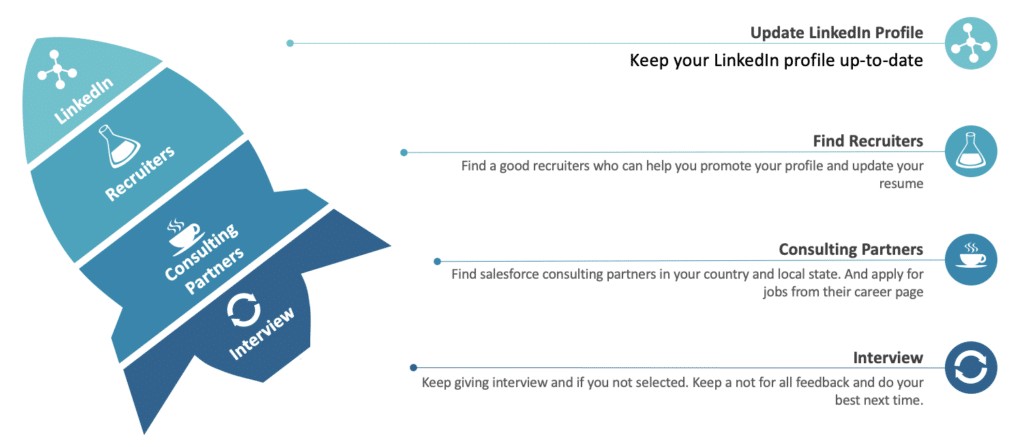How Long Does It Take To Learn Salesforce Developer skills? Understanding the time commitment to become a proficient Salesforce Developer is crucial for anyone considering this career path. This comprehensive guide from LEARNS.EDU.VN explores the factors influencing the learning curve, provides a structured roadmap, and highlights the resources available to accelerate your journey, offering insights into Salesforce Development, career advancement, and strategies for effective learning.
1. Understanding the Salesforce Developer Role
A Salesforce Developer is a specialized programmer who builds custom applications and solutions on the Salesforce platform. These professionals leverage coding languages like Apex, JavaScript, Aura, and Lightning Web Components (LWC) to tailor the platform to meet specific business needs. Let’s delve into the core responsibilities and required skills.
1.1. Salesforce Developer Responsibilities
Salesforce Developers are responsible for a variety of tasks, including:
- Custom Application Development: Creating new applications from scratch or extending existing Salesforce functionalities to address unique business challenges.
- Platform Customization: Tailoring the Salesforce platform using code to meet specific client requirements that cannot be addressed by out-of-the-box features.
- Code Maintenance & Optimization: Ensuring the stability, performance, and scalability of existing codebases through regular maintenance, updates, and optimization efforts.
- Integration: Connecting Salesforce with other systems and platforms to enable seamless data flow and process automation across different business functions.
- Testing & Debugging: Identifying and resolving bugs, errors, and performance issues in code through thorough testing and debugging processes.
- Collaboration: Working closely with project managers, business analysts, and other stakeholders to understand requirements, propose solutions, and deliver high-quality results.
1.2. Essential Skills for Salesforce Developers
To excel as a Salesforce Developer, certain skills are essential:
- Programming Proficiency: A solid understanding of programming concepts and experience with languages like Apex, JavaScript, HTML, and CSS.
- Salesforce Platform Knowledge: A deep understanding of the Salesforce platform, its architecture, and its various components and functionalities.
- Problem-Solving Skills: The ability to analyze complex problems, identify root causes, and develop effective solutions.
- Analytical Skills: Proficiency in gathering and analyzing requirements, translating them into technical specifications, and designing solutions that meet business needs.
- Communication Skills: Excellent verbal and written communication skills to effectively interact with team members, clients, and stakeholders.
- Teamwork: The ability to work collaboratively in a team environment, contribute ideas, and support colleagues to achieve common goals.
2. Factors Influencing the Learning Timeline
Several factors can affect how long it takes to become a proficient Salesforce Developer. Understanding these can help you create a realistic learning plan and set achievable goals.
2.1. Prior Programming Experience
Having prior experience with programming languages is a significant advantage. Individuals with a background in languages such as Java, C++, or Python may find it easier to grasp the syntax and concepts of Apex and JavaScript, which are crucial for Salesforce development.
- Benefit: Reduces the initial learning curve, allowing you to focus on Salesforce-specific concepts sooner.
- Consideration: Even with prior experience, understanding the nuances of the Salesforce platform is essential.
2.2. Learning Style and Dedication
Your preferred learning style and the amount of time you dedicate to studying and practicing will significantly impact your progress. Some individuals thrive in structured learning environments, while others prefer self-paced learning.
- Structured Learning: Enrolling in courses or bootcamps provides a structured curriculum and expert guidance.
- Self-Paced Learning: Utilizing online resources and Trailhead allows for flexibility but requires discipline and self-motivation.
- Dedication: Consistent study and practice are essential for solidifying your knowledge and developing practical skills.
2.3. Access to Resources and Mentorship
Having access to quality learning resources, such as Trailhead, online courses, and documentation, can accelerate your learning. Additionally, having a mentor who can provide guidance, answer questions, and offer feedback can be invaluable.
- Trailhead: Salesforce’s free online learning platform offers a wealth of resources for learning the platform and developing practical skills.
- Online Courses: Platforms like Udemy, Coursera, and Pluralsight offer comprehensive courses on Salesforce development.
- Mentorship: A mentor can provide personalized guidance, share their experiences, and help you navigate challenges.
2.4. Complexity of Projects
Working on real-world projects, whether through internships, volunteer opportunities, or personal projects, is crucial for developing practical skills and gaining experience. The complexity of these projects will influence how quickly you learn and grow as a developer.
- Start Small: Begin with simple projects to build a solid foundation and gradually increase the complexity as you gain confidence.
- Real-World Scenarios: Focus on projects that simulate real-world business challenges to develop practical problem-solving skills.
- Collaboration: Work on projects with other developers to learn from their experiences and gain exposure to different approaches.
3. Estimated Timeframes for Learning Salesforce Development
While the exact timeframe can vary, here are some general estimates for different stages of learning Salesforce development.
3.1. Beginner Level (0-3 Months)
At the beginner level, you’ll focus on understanding the fundamentals of the Salesforce platform and the basics of programming.
-
Key Topics:
- Salesforce Fundamentals: Understanding Salesforce terminology, navigation, and core features.
- Apex Basics: Learning the syntax, data types, and control structures of Apex.
- SOQL and DML: Understanding how to query and manipulate data in Salesforce.
- Trailhead Modules: Completing beginner-level Trailhead modules to gain hands-on experience.
-
Activities:
- Enrolling in introductory Salesforce courses.
- Creating a developer account and exploring the platform.
- Completing Trailhead modules and projects.
- Participating in online forums and communities.
3.2. Intermediate Level (3-6 Months)
At the intermediate level, you’ll delve deeper into Apex programming, explore Lightning Web Components, and gain experience with more complex development tasks.
-
Key Topics:
- Apex Triggers: Understanding how to use triggers to automate business processes.
- Lightning Web Components: Learning how to build custom user interfaces using LWC.
- Asynchronous Apex: Understanding how to use Batch Apex and Queueable Apex for long-running processes.
- Testing and Debugging: Learning how to write unit tests and debug Apex code.
-
Activities:
- Building custom Lightning Web Components.
- Developing Apex triggers to automate business processes.
- Working on more complex Trailhead projects and superbadges.
- Contributing to open-source Salesforce projects.
3.3. Advanced Level (6-12+ Months)
At the advanced level, you’ll master advanced Apex concepts, become proficient in integrating Salesforce with other systems, and develop expertise in designing and architecting complex solutions.
-
Key Topics:
- Advanced Apex: Exploring advanced topics such as governor limits, design patterns, and integration techniques.
- Salesforce Integration: Learning how to integrate Salesforce with external systems using REST and SOAP APIs.
- Security: Understanding Salesforce security best practices and how to protect data.
- Architectural Design: Learning how to design and architect complex Salesforce solutions.
-
Activities:
- Designing and implementing complex Salesforce solutions.
- Integrating Salesforce with external systems.
- Leading development teams and mentoring junior developers.
- Obtaining advanced Salesforce certifications.
4. Creating a Learning Roadmap
A structured learning roadmap can help you stay on track and achieve your goals. Here’s a sample roadmap to guide your journey:
4.1. Phase 1: Foundations (1-2 Months)
- Goal: Build a solid foundation in Salesforce fundamentals and basic programming concepts.
- Tasks:
- Complete the Salesforce Administrator Trail on Trailhead.
- Enroll in an introductory Apex programming course.
- Set up a Salesforce Developer Edition account.
- Participate in Salesforce community forums and groups.
4.2. Phase 2: Core Development Skills (2-4 Months)
- Goal: Develop core Salesforce development skills, including Apex programming, Lightning Web Components, and data manipulation.
- Tasks:
- Complete the Apex Specialist Superbadge on Trailhead.
- Build custom Lightning Web Components for various use cases.
- Develop Apex triggers to automate business processes.
- Practice writing unit tests and debugging Apex code.
4.3. Phase 3: Advanced Topics and Specialization (4-6+ Months)
- Goal: Master advanced Salesforce development topics and specialize in a specific area, such as integration or architecture.
- Tasks:
- Explore advanced Apex topics, such as governor limits and design patterns.
- Learn how to integrate Salesforce with external systems using APIs.
- Obtain Salesforce Platform Developer I and II certifications.
- Contribute to open-source Salesforce projects.
5. Resources for Learning Salesforce Development
Numerous resources are available to help you learn Salesforce development. Here are some of the most popular and effective options:
5.1. Trailhead
Trailhead is Salesforce’s free online learning platform, offering a wealth of modules, projects, and superbadges to help you learn the platform and develop practical skills.
- Benefits:
- Free and accessible to anyone.
- Comprehensive coverage of Salesforce topics.
- Hands-on learning through projects and challenges.
- Gamified learning experience to keep you engaged.
5.2. Online Courses
Platforms like Udemy, Coursera, and Pluralsight offer comprehensive courses on Salesforce development, taught by experienced instructors.
- Benefits:
- Structured curriculum and expert guidance.
- In-depth coverage of specific topics.
- Opportunities to ask questions and get feedback.
- Certificates of completion to showcase your skills.
5.3. Salesforce Documentation
The official Salesforce documentation is a valuable resource for understanding the platform and its features.
- Benefits:
- Comprehensive and up-to-date information.
- Detailed explanations of Salesforce concepts and features.
- Code samples and examples to guide your learning.
- Available online for easy access.
5.4. Community Forums and Groups
Participating in online forums and groups, such as the Salesforce Trailblazer Community, can provide support, answer questions, and connect you with other learners and experienced developers.
- Benefits:
- Access to a community of knowledgeable and helpful individuals.
- Opportunities to ask questions and get advice.
- Networking opportunities with other professionals.
- Stay up-to-date on the latest Salesforce trends and technologies.
5.5 LEARNS.EDU.VN
LEARNS.EDU.VN offers a wide range of educational resources, including articles and courses on Salesforce development. It’s a great place to find in-depth guides and expert insights to help you succeed.
6. Tips to Accelerate Your Learning
Here are some practical tips to help you learn Salesforce development more quickly and effectively:
6.1. Focus on Hands-On Practice
The best way to learn Salesforce development is by doing. Focus on building projects, completing challenges, and writing code.
- Start with Small Projects: Begin with simple projects to build a solid foundation and gradually increase the complexity.
- Work on Real-World Scenarios: Focus on projects that simulate real-world business challenges to develop practical problem-solving skills.
- Contribute to Open-Source Projects: Contributing to open-source Salesforce projects can provide valuable experience and exposure to different development approaches.
6.2. Break Down Complex Topics
When learning complex topics, break them down into smaller, more manageable chunks. This will make it easier to understand and retain the information.
- Identify Core Concepts: Identify the core concepts that underpin each topic and focus on understanding those first.
- Use Examples and Analogies: Use examples and analogies to help you visualize and understand complex concepts.
- Practice Regularly: Practice regularly to reinforce your understanding and build your skills.
6.3. Seek Help When Needed
Don’t be afraid to ask for help when you’re stuck. Reach out to mentors, colleagues, or community members for guidance and support.
- Join Online Forums and Groups: Participate in online forums and groups to ask questions and get advice from experienced developers.
- Attend Local Meetups and Events: Attend local meetups and events to network with other professionals and learn from their experiences.
- Find a Mentor: A mentor can provide personalized guidance, share their experiences, and help you navigate challenges.
6.4. Stay Consistent
Consistency is key to learning any new skill. Set aside dedicated time each day or week to study and practice Salesforce development.
- Create a Study Schedule: Create a study schedule that fits your lifestyle and stick to it as much as possible.
- Set Realistic Goals: Set realistic goals for each study session to stay motivated and focused.
- Track Your Progress: Track your progress to see how far you’ve come and identify areas where you need to improve.
7. Common Challenges and How to Overcome Them
Learning Salesforce development can be challenging, but with the right strategies, you can overcome common obstacles.
7.1. Understanding Governor Limits
Salesforce governor limits can be confusing for new developers. To overcome this challenge:
- Study the Documentation: Review the official Salesforce documentation on governor limits to understand the different types of limits and how they work.
- Use Best Practices: Follow best practices for writing efficient and scalable code to minimize the risk of hitting governor limits.
- Test Your Code: Test your code thoroughly to identify and resolve any performance issues that could lead to governor limit errors.
7.2. Mastering Asynchronous Apex
Asynchronous Apex can be complex, but it’s essential for handling long-running processes. To master this topic:
- Start with the Basics: Begin by understanding the different types of asynchronous Apex, such as Batch Apex and Queueable Apex.
- Practice with Examples: Work through examples and tutorials to gain hands-on experience with asynchronous Apex.
- Use Debugging Tools: Use Salesforce debugging tools to monitor and troubleshoot asynchronous Apex processes.
7.3. Integrating with External Systems
Integrating Salesforce with external systems can be challenging due to the complexity of APIs and data formats. To overcome this challenge:
- Study API Documentation: Review the API documentation for the external system you’re integrating with to understand the available endpoints and data formats.
- Use Integration Tools: Consider using integration tools, such as MuleSoft or Informatica, to simplify the integration process.
- Test Your Integration: Test your integration thoroughly to ensure that data is flowing correctly between Salesforce and the external system.
8. Career Paths for Salesforce Developers
Becoming a Salesforce Developer opens up a variety of career paths. Here are some of the most common roles:
8.1. Salesforce Developer
As a Salesforce Developer, you’ll be responsible for building custom applications and solutions on the Salesforce platform.
- Responsibilities: Designing, developing, and testing custom Salesforce applications.
- Skills: Apex, Lightning Web Components, SOQL, DML, Salesforce APIs.
8.2. Salesforce Technical Architect
As a Salesforce Technical Architect, you’ll be responsible for designing and architecting complex Salesforce solutions.
- Responsibilities: Designing the overall architecture of Salesforce solutions, ensuring scalability, security, and performance.
- Skills: Salesforce platform expertise, architectural design principles, integration patterns, communication skills.
8.3. Salesforce Consultant
As a Salesforce Consultant, you’ll work with clients to understand their business needs and implement Salesforce solutions that meet those needs.
- Responsibilities: Gathering requirements, designing solutions, configuring Salesforce, and training users.
- Skills: Salesforce platform expertise, business analysis, communication skills, project management.
8.4. Salesforce Technical Lead
As a Salesforce Technical Lead, you’ll lead a team of developers, overseeing the technical aspects of projects.
- Responsibilities: Guiding and mentoring the team, ensuring code quality, and making key technical decisions.
- Skills: Salesforce development expertise, leadership abilities, and strong communication skills.
9. Salaries for Salesforce Developers
The salary for Salesforce Developers can vary depending on experience, location, and skills. Here are some general estimates:
| Location | Junior pay band | Senior pay band |
|---|---|---|
| United States($) | 101,750 – 130,250 | 130,250 – 180,000+ |
| Canada (C$) | 108,750 – 133,750 | 133,750 – 165,000+ |



- Entry-Level: $70,000 – $90,000 per year.
- Mid-Level: $90,000 – $120,000 per year.
- Senior-Level: $120,000+ per year.
10. The Future of Salesforce Development
The demand for Salesforce Developers is expected to continue growing in the coming years. As more companies adopt Salesforce, the need for skilled developers to customize and extend the platform will increase. Staying up-to-date with the latest Salesforce technologies and trends will be essential for career success.
10.1. Emerging Trends
- AI and Machine Learning: Integrating AI and machine learning capabilities into Salesforce applications.
- Low-Code Development: Using low-code platforms like Lightning App Builder to build applications more quickly and easily.
- Mobile Development: Building mobile apps that integrate with Salesforce.
10.2. Continuous Learning
- Stay Updated: Follow Salesforce blogs, attend webinars, and participate in community events to stay up-to-date with the latest trends.
- Obtain Certifications: Obtain Salesforce certifications to validate your skills and demonstrate your expertise.
- Experiment: Experiment with new technologies and techniques to expand your skillset.
FAQ Section
Q1: How long does it generally take to become a Salesforce developer?
It typically takes 2-6 months to become an entry-level Salesforce developer if you have prior programming experience. Without prior experience, it may take longer.
Q2: Can a non-IT person learn Salesforce development?
Yes, it is possible for a non-IT person to learn Salesforce development. Many successful Salesforce developers come from non-IT backgrounds.
Q3: What programming languages are essential for Salesforce development?
Apex, JavaScript, HTML, and CSS are essential programming languages for Salesforce development.
Q4: Is a computer science degree necessary to become a Salesforce developer?
A computer science degree is not strictly necessary, but it can be helpful. Many successful Salesforce developers have degrees in other fields or no degree at all.
Q5: How can I gain hands-on experience with Salesforce development?
You can gain hands-on experience by building projects, contributing to open-source projects, and volunteering for nonprofits.
Q6: Are Salesforce certifications worth it?
Yes, Salesforce certifications can be valuable for demonstrating your skills and increasing your job prospects.
Q7: What is Trailhead, and how can it help me learn Salesforce development?
Trailhead is Salesforce’s free online learning platform, offering a wealth of modules, projects, and superbadges to help you learn the platform and develop practical skills.
Q8: How important is networking in the Salesforce ecosystem?
Networking is essential in the Salesforce ecosystem. It allows you to connect with other professionals, learn from their experiences, and find job opportunities.
Q9: What are some common challenges faced by new Salesforce developers?
Common challenges include understanding governor limits, mastering asynchronous Apex, and integrating with external systems.
Q10: What are some career paths for Salesforce developers?
Career paths for Salesforce developers include Salesforce Developer, Salesforce Technical Architect, and Salesforce Consultant.
Conclusion
So, how long does it take to learn Salesforce development? The answer depends on your background, learning style, and dedication. With a structured roadmap, consistent effort, and the right resources, you can become a proficient Salesforce Developer in a matter of months. LEARNS.EDU.VN is committed to providing you with the knowledge and resources you need to succeed in your journey.
Ready to take the next step? Visit LEARNS.EDU.VN today to explore our comprehensive resources and courses on Salesforce development. Whether you’re a beginner or an experienced developer, we have something to help you achieve your goals. Contact us at 123 Education Way, Learnville, CA 90210, United States, or WhatsApp us at +1 555-555-1212 to learn more. Start your journey to becoming a Salesforce Developer with learns.edu.vn today.

